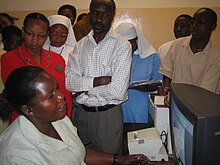Women in the workforce
Appearance
(Redirected from Women workers)

Quotes about Women in the workforce.
| This economics-related article is a stub. You can help out with Wikiquote by expanding it! |
| This sociology-related article is a stub. You can help out with Wikiquote by expanding it! |
Quotes
[edit]- They spend billions of hours cooking, cleaning and caring for children and the elderly. Unpaid care work is the 'hidden engine' that keeps the wheels of our economies, businesses and societies moving. It is driven by women who often have little time to get an education, earn a decent living or have a say in how our societies are run, and who are therefore trapped at the bottom of the economy.
- The worker is the slave of capitalist society, the female worker is the slave of that slave.
- James Connolly, The Re-conquest of Ireland (1915), Chapter VI: Woman, p. 38, Marxists Internet Archive
- Women are in HR to clean up men’s messes.
- GitHub’s senior director of global HR services, Gia Colosi according to GitHub’s head of HR resigns in light of termination of Jewish employee January 17, 2021
- Our economy cannot fully recover unless women can participate fully. I believe, I think we all believe, this is a national emergency — women leaving the workforce in these numbers is a national emergency, which demands a national solution.
- Kamala Harris in "Kamala Harris: Women Are Facing A National Emergency" (February 18, 2021)
- It must be admitted that, although I possessed a certain degree of ambition, like every other active human being, I was never animated by the desire to obtain "a post." For me "what I am" was always of less importance than "what I can," that is to say, what I was in a position to accomplish. In this way I, too, had my ambition and it was especially noticeable there where I stood with my whole heart and soul in the struggle, where the issue was the abolition of the slavery of working women.
- Alexandra Kollontai, The Autobiography of a Sexually Emancipated Communist Woman (1926), Translated by Salvator Attanasio, Herder and Herder, 1971.
- On November 20, the Karnataka government issued a notification allowing women to work night shifts (7 p.m. to 6 a.m.) in all factories registered under the Factories Act, 1948. [...] In principle, this is a welcome move. However, several concerns have been voiced by women garment workers who are estimated to constitute over 90% of the five lakh garment workers in Karnataka (according to data by Asia Floor Wage Alliance, a global coalition of trade unions). The amendment suggests that night shifts for women will only be allowed if the employer ensures adequate safeguards concerning occupational safety and health, protection of dignity and honour, and transportation from the factory premises to points nearest to the worker’s residence. The amendment stipulates 24 points related to occupational rules and regulations, most of which have been in existence for years. Yet, women workers fear that when there is no safety or dignity in the workplace even during daytime, how will employers ensure all this during night shifts?
- Neethi Padmanabhan and Nandita Shivakumar, New rules, old problems (December 25, 2019), The Hindu
- In a sector where there is systemic failure and worker-management relations are turbulent, putting the onus of worker safety and security in the hands of the management alone can be risky. Moreover, it is well-known that in supply chains the brands call the shots. Involving them in discussions on worker dignity and equality is important. Omitting workers and trade unions from discussions about the amendment is also seen by the workers as a short-sighted measure. Women garment workers are concerned that while the amendment has stipulated many 'new' guidelines amidst the plethora of unaddressed concerns, allowing night shifts would only extend daytime exploitation.
- Neethi Padmanabhan and Nandita Shivakumar, New rules, old problems (December 25, 2019), The Hindu
- Coronavirus child-care crisis will set women back a generation. [o]ne out of four women who reported becoming unemployed during the pandemic said it was because of a lack of child care—twice the rate among men.
- Washington Post article according to How COVID-19 Sent Women’s Workforce Progress Backward October 30, 2020


